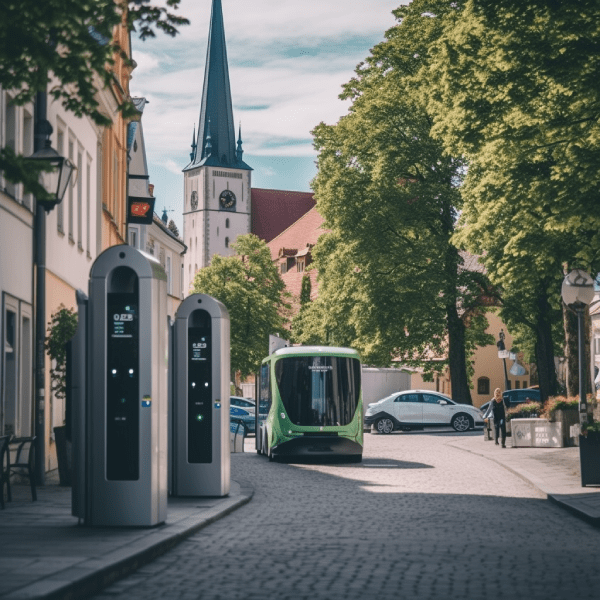Introduction
Artificial Intelligence (AI) is a rapidly growing field of computer science that focuses on developing smart machines that can perform tasks that usually require human intelligence, such as perception, reasoning, learning, and decision-making. AI has already revolutionized various industries, including healthcare, finance, transportation, and manufacturing. Now, AI is emerging as a powerful tool to tackle the most significant challenge facing humanity: sustainability. In this blog post, we will discuss how AI can contribute to achieving sustainability.
AI for energy efficiency
The energy sector is one of the major contributors to greenhouse gas emissions. However, AI can play a crucial role in reducing energy consumption and increasing energy efficiency. For example, AI algorithms can analyze data from smart meters and sensors to optimize energy consumption in buildings, factories, and transportation systems. According to the International Energy Agency, AI could help reduce global energy consumption by up to 10% by 2040, which is equivalent to the energy consumption of the entire European Union in 2019.
AI for climate change
Climate change is the biggest threat to our planet, and AI can help us mitigate its impacts. AI-powered climate models can simulate different scenarios of climate change, helping us understand the potential effects of global warming and make better decisions on reducing emissions. Moreover, AI can analyze satellite imagery to monitor deforestation, track changes in land use, and detect natural disasters, such as wildfires and floods, in real-time. This information can help policymakers take timely action to mitigate the impacts of climate change.
AI for sustainable agriculture
Agriculture is another sector that can benefit significantly from AI. AI-powered precision agriculture can optimize crop yields by analyzing data from sensors, drones, and satellite imagery. By providing farmers with real-time information on soil quality, weather conditions, and crop health, AI can reduce water and fertilizer usage and increase crop productivity. According to the World Economic Forum, AI-powered precision agriculture could increase global crop yields by 70% by 2050.
AI for sustainable transportation
The transportation sector is responsible for a significant portion of global greenhouse gas emissions. However, AI can help reduce emissions and increase efficiency in transportation systems. For example, AI-powered traffic management systems can optimize traffic flow, reducing congestion and emissions. Moreover, AI can help develop autonomous vehicles, which can reduce the number of accidents and improve fuel efficiency. According to a study by the Boston Consulting Group, the widespread adoption of autonomous vehicles could reduce global greenhouse gas emissions by up to 60%.
AI for sustainable business
AI can help businesses become more sustainable by optimizing supply chain management, reducing energy consumption, improving sustainable product design, and enhancing operations. AI algorithms can analyze data, identify opportunities for reducing waste and increasing efficiency, and help companies meet the growing demand for sustainable products and services. By using AI, businesses can become more socially and environmentally responsible, reduce their environmental footprint, and contribute to a more sustainable future.
Conclusion
Artificial Intelligence is emerging as a key tool to achieve sustainability, and its potential benefits are enormous. From reducing energy consumption to mitigating the impacts of climate change, AI can help us create a more sustainable future. However, it is essential to ensure that AI is developed and used responsibly, taking into account its potential risks, such as bias, privacy violations, and job displacement. By leveraging the power of AI, we can build a more sustainable world for future generations.
Here are some examples of companies developing AI programs that solve sustainability problems:
- Microsoft: Microsoft has developed an AI-powered tool called “AI for Earth,” which aims to help organizations address environmental challenges such as climate change, biodiversity loss, and water scarcity. The tool provides access to machine learning algorithms and data sets that can be used to develop sustainable solutions. According to Microsoft, AI for Earth has supported more than 500 projects in 87 countries, reducing greenhouse gas emissions by over 20 million metric tons.
- IBM: IBM has developed an AI-powered tool called “Watson for Climate,” which aims to help organizations understand and address the impacts of climate change. The tool analyzes climate data and provides insights into how different factors, such as temperature, precipitation, and sea level rise, will affect different regions. According to IBM, Watson for Climate has been used by organizations such as The Nature Conservancy to identify areas of high conservation value.
- Google: Google has developed an AI-powered tool called “DeepMind,” which aims to reduce energy consumption in data centers. DeepMind uses machine learning algorithms to optimize the cooling systems in Google’s data centers, reducing energy consumption by up to 40%. According to Google, DeepMind has reduced the company’s overall energy consumption by 15%.
- Siemens: Siemens has developed an AI-powered tool called “EnergyIP Analytics,” which aims to help utilities optimize their energy consumption and reduce greenhouse gas emissions. The tool analyzes data from smart meters, weather forecasts, and other sources to provide insights into energy consumption patterns and identify opportunities for optimization. According to Siemens, EnergyIP Analytics has helped utilities reduce energy consumption by up to 20%.
- Tesla: Tesla has developed an AI-powered tool called “Autopilot,” which aims to reduce the number of accidents and improve fuel efficiency in transportation systems. Autopilot uses machine learning algorithms to analyze data from cameras, sensors, and radar to control the vehicle’s speed, steering, and braking. According to Tesla, Autopilot has reduced the number of accidents by up to 40%.
- Intel: Intel has developed an AI-powered tool called “Intel Saffron,” which aims to help organizations manage sustainability risks in their supply chains. The tool analyzes data from suppliers, such as audit reports and social media, to identify potential risks, such as environmental violations and labor abuses. According to Intel, Saffron has helped companies reduce supply chain risks by up to 50%.
- BlackRock: BlackRock, the world’s largest asset manager, has developed an AI-powered tool called “Aladdin Climate,” which aims to help investors measure and manage the climate risk of their portfolios. The tool uses machine learning algorithms to analyze data on climate-related risks and opportunities to provide insights into how investors can manage their portfolios to align with the goals of the Paris Agreement. According to BlackRock, Aladdin Climate has helped investors measure the carbon footprint of their portfolios and develop strategies to reduce emissions.
- Accenture: Accenture has developed an AI-powered tool called “Circularity Analyzer,” which aims to help companies transition to a circular economy. The tool uses machine learning algorithms to analyze data on materials, products, and waste to identify opportunities for reuse, recycling, and other circular strategies. According to Accenture, Circularity Analyzer has helped companies reduce waste and increase efficiency in their operations.
- Plantix: Plantix is an AI-powered app that helps farmers identify and diagnose crop diseases and pests. The app uses machine learning algorithms to analyze images of crops and provide recommendations on how to manage and treat the diseases and pests. According to Plantix, the app has helped farmers increase crop yields and reduce pesticide use.
- Alibaba Group: Alibaba Group, the Chinese e-commerce giant, has developed an AI-powered tool called “Green Logistics,” which aims to reduce emissions from its logistics operations. The tool uses machine learning algorithms to optimize delivery routes, reduce fuel consumption, and improve logistics efficiency. According to Alibaba, Green Logistics has reduced emissions from its logistics operations by up to 30%.
These are just a few more examples of companies using AI to address sustainability challenges. By harnessing the power of AI, these companies are driving innovation and helping us build a more sustainable future.



